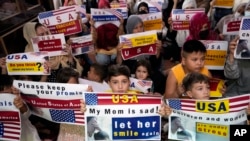Relocation flights from Afghanistan carrying Special Immigrant Visa (SIV) applicants to U.S. immigration processing centers in Qatar and other countries have been suspended for more than one month, and it's unclear when they will resume.
For nearly two years since the Taliban seized power in Afghanistan, the U.S. Department of State's Office of the Coordinator for Afghan Relocation Efforts (CARE) has been relocating SIV-eligible Afghans by air and overland routes.
The U.S. government used military planes to evacuate tens of thousands of Afghans amid a chaotic withdrawal from the country in August 2021.
Subsequently, most Afghans have been relocated by chartered commercial flights from Taliban-controlled Kabul airport.
A spokesperson for the Department of State confirmed that the relocation flights have been "paused since mid-June" but did not offer additional details because of operational sensitivity.
"We are hopeful these flights will resume soon," the spokesperson said.
Despite condemning the Taliban's repressive policies, U.S. officials had previously welcomed the ability of SIV-eligible Afghans to board relocation flights.
Sources involved in support of CARE operations gave different explanations for the pause in the flights from Kabul.
One source, who asked not to be named in this article because they were not authorized to publicly discuss the group's security and operational issues, said the Taliban had suspended the flights because of internal disagreements.
However, Zabihullah Mujahid, a Taliban spokesperson, said he was not aware of any restrictions imposed on the relocation flights on their part.
A second source said the U.S. had paused the flights due to concerns that the Taliban leadership was benefiting from the chartered flights by Afghan carriers, potentially violating U.S. economic sanctions on the Taliban.
Calls for resumption
While the U.S. has no diplomatic presence in Afghanistan and has largely curtailed engagement with de facto Taliban authorities, activists say now is not the time to wind down the relocation program.
"Any efforts that the U.S. has to meet our obligation to our allies should not be paused," said Shawn VanDiver, president of #AfghanEvac, an umbrella body of individuals and non-government organizations advocating for Afghans who worked for the U.S. in Afghanistan.
"We have an obligation to those left behind," said Chris Purdy, director of Veterans for American Ideals and Outreach, a coalition of veterans that advocate for human rights.
Over 152,000 Afghans who say they worked for the U.S. military in Afghanistan prior to the Taliban's return to power in August 2021 have applied for the SIV program, according to the Department of State.
They are competing for about 17,000 principal SIVs remaining in the program. Some U.S. lawmakers have proposed legislation that will add 20,000 additional principal SIVs through 2029.
Human rights groups have accused the Taliban of targeting former Afghan government forces and individuals who worked for the U.S. in the past, a charge the Taliban deny, saying the group has offered a general amnesty.
"I don't trust the Taliban," Purdy told VOA. "Just because someone has successfully hidden for two years doesn't mean that they should have to live their lives under fear."
Critics have also complained that the program is not moving quickly or efficiently enough to relocate vulnerable Afghans.
"For nearly two years, the U.S. government has failed to evacuate at-risk Afghans in a speedy and efficient manner," said Adam Bates, a policy counsel with the International Refugee Assistance Project (IRAP).
The IRAP has filed a lawsuit in a U.S. court accusing the government of leaving thousands of Afghan and Iraqi SIV applicants at serious risk in their home countries.
"Instead of abandoning its allies, the U.S. must increase efforts and resources to create viable pathways to safety for at-risk Afghans, better late than never," said Bates.
U.S. officials say they are committed to making every feasible effort to relocating SIV-eligible Afghans.
"Many factors in the relocation process impact the pace of operations and are out of the control of the U.S. government," said the Department of State's spokesperson.






